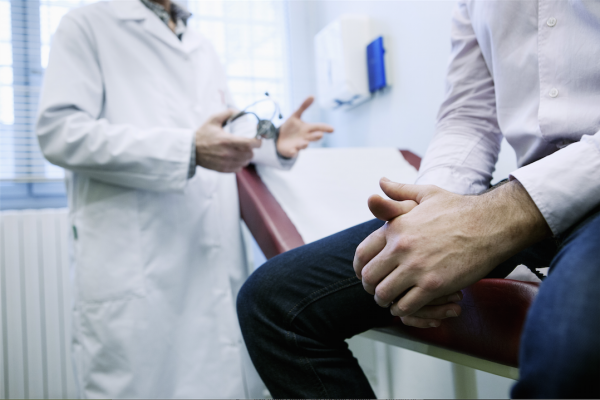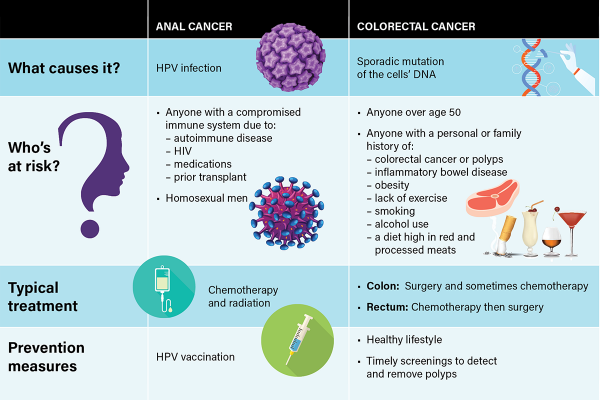When it comes to cancer screening and prevention, Roswell Park Comprehensive Cancer Center utilizes the most advanced technologies to provide patients with an accurate diagnosis and clear next steps. The Anal Cancer Prevention Program offers important screening services to those most at risk.
Anal cancer screening also can detect abnormal cells and precancerous lesions before they develop into cancer. Prompt treatment can stop the growth of abnormal cells and prevent anal cancer.
Am I at risk for anal cancer?
Some people face a higher risk of developing anal cancer due to other medical conditions or medications they take. You may be at risk for developing anal cancer if you have any of these risk factors:
- Human immunodeficiency virus (HIV)
- History of cervical, vaginal, or vulvar cancer or high-grade dysplasia.
- Are a man with male sexual partners
- Received an organ transplant (get screened 10 years after transplant)
- History of persistent cervical HPV 16 infection
- Anal warts
- Are taking medications that suppress your immune system, such as treatment for autoimmune conditions like rheumatoid arthritis, lupus, Crohn’s disease or ulcerative colitis.
“Unfortunately, with anal cancer, symptoms will typically appear when the disease is more advanced,” says Jason Rein, MSN, NP, a nurse practitioner in the Survivorship program at Roswell Park. “Symptoms can be bleeding, anal pain, itching, lesions, or sometimes people will feel a mass.” He also explains that many patients will attribute these symptoms to other health-related issues, such as hemorrhoids.
Because the disease poses only minimal symptoms, if any, in early stages, experts recommend that people most at risk receive regular screenings in order to detect and treat abnormal cells or lesions before they become cancerous. “The recommendation for those in higher risk groups is to get an anal pap, which is similar to a cervical pap smear,” explains Rein. Depending on your risk levels, this screening should be performed every year.
Take our online screening assessment
Find out your risk for developing certain cancers by taking our online screening assessment today!
Why Roswell Park for anal cancer screening?
If the results of the anal pap show the presence of abnormal cells, the next step is to undergo a high-resolution anoscopy (HRA) – an exam that checks for anal dysplasia, or pre-cancerous cells, using a special microscope called a colposcope.
Roswell Park is one of the few centers in New York State with the capabilities to offer HRA to those with abnormal results. “Typically, if a patient does have an abnormal anal pap, they will be referred to us. We are the second step of screening,” says Rein. “Patients also will be referred to us if they’ve had an incidental finding of abnormal cells from a biopsy of a hemorrhoid, wart or anal lesion.”
“The procedure is quick, normally 10 to 15 minutes, and relatively painless. We’ll use acetic acid and an iodine solution to prep the anal canal to examine with a colposcope for any lesions or micro-stigmata of disease. The way the solution is absorbed helps us to determine which lesions to biopsy,” explains Rein. Those biopsied lesions are further examined by a pathologist to decide if treatment is necessary. “What we’re looking for are called high-grade squamous intraepithelial lesions, or HSIL. We can utilize several different treatment options based on each patient’s circumstances to ultimately prevent those cells from progressing into anal cancer.”
Overcoming the stigmas
It’s no secret this particular type of cancer screening can come with predetermined stigmas that may deter people from seeking an appointment. “It’s an area of our bodies and our overall healthcare that is neglected. It’s our goal to make patients feel comfortable with us, make the exam as comfortable as possible and take the time to educate them,” says Rein. “We explain the disease, the follow up and the importance of why we’re doing this.”
Because this is a short procedure and relatively painless (assisted by the use of a numbing lubrication and medication) Rein is hopeful that people with risk factors won’t delay their screenings. “If it’s caught early, it can really prevent the cancer from spreading and make treatment much easier,” he says. “We want them to follow through with us for the long term. It’s a lot of education, relationship building and partnering with patients, so they know what’s going on at all aspects.”


